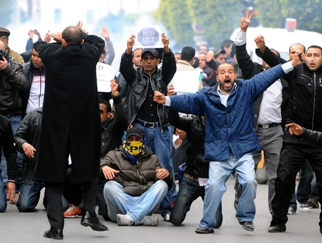Harvard University’s
Niall Fergusonrecently criticized the Obama Administration for lacking foresight and planning over the events in Egypt. The point of his criticisms of the Administration—and, by extension, the European Union—was illustrated over a year ago in a Heritage Foundation “war game.”
In late 2009, Heritage invited security experts and Washington-based policymakers to “game” a fictional scenario of its own whereby Tunisia was hit with a major earthquake. Significant political and civil unrest followed, accompanied by large numbers of refugees flowing from Tunisia to Italy and Malta.
The exercise was intended to test how well
NATO and the EU would respond to such crises, and it proved eerily predictive of current events in North Africa. In Heritage’s simulation, when Tunisia was hit by the fictional earthquake, the EU foreign minister made a number of statements proclaiming leadership of the crisis. The player simulating the role of the U.K. stated that this mission was an opportunity for the EU to demonstrate its much-vaunted ability to project soft power, and the U.S. was happy to see Europeans taking the lead for the crisis.
Although the EU foreign minister worked tirelessly to rally firm peacekeeping and financial contributions from member states for a large-scale European response, she was ultimately unsuccessful. Italy, Malta, and other affected nations were left largely alone to struggle with massive refugee influxes. The EU foreign minister did little more than make a number of political statements and call international conferences. Neither the EU nor the Tunisian government could gain control of the situation, and security in the affected region quickly declined.
Reports also emerged that Islamists were using the situation to migrate into Europe undetected. Italy proved exasperated that its demands for more EU action went ignored. When Heritage announced that a second security crisis had erupted in the Balkans (as has happened in Egypt in real life), the players fell victim to their “one crisis at a time” method of working.
In reality, few European nations had the forces or political will necessary to deal effectively with either crisis, and America failed to play its traditional leadership role, having been assured that the EU was to be taken seriously following the introduction of the Lisbon Treaty.
The Heritage simulation demonstrated that EU assertions of leadership lacked substance—which is exactly what has happened in real life. An estimated
5,000 asylum seekers have reportedly arrived on the Italian island of Lampedusa, and Interior Minister Roberto Maroni has stated that Italy had been “left alone” to deal with the problem. The EU’s response has seen Foreign Minister Cathy Ashton pledge aid and trade deals (sometime in the next five years) and invite various members of the interim Tunisian government to Brussels. However, her actions have done little to address the worsening security situation for Europe or Tunisia. In Heritage’s scenario, negotiating an EU response enabled many countries to shirk their responsibilities, and the EU’s
Common Foreign and Security Policy was again exposed as a paper tiger—as it was in the Balkans in the 1990s.
The messages from this simulation are clear:
- There are simply not enough forces to go around for the number of crises that Europe and NATO need to cope with;
- Neither the U.S. nor Europe has the luxury of assuming that crises will come “one at a time” or on a timetable that is convenient for Washington or Brussels;
- The EU is not a credible actor for large-scale humanitarian or security missions and is unwilling to appropriate the military equipment necessary for these missions.
For the U.S., the Obama Administration should take note. The EU is no substitute for the transatlantic alliance, and American leadership is still needed around the world.



